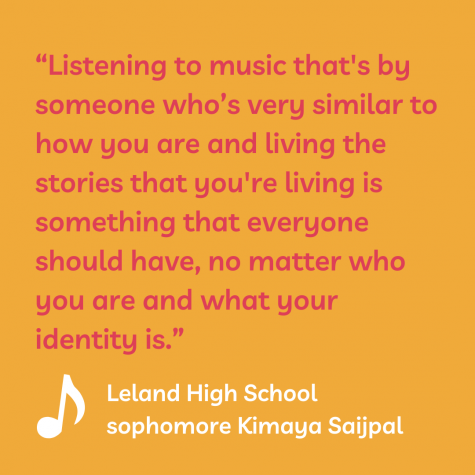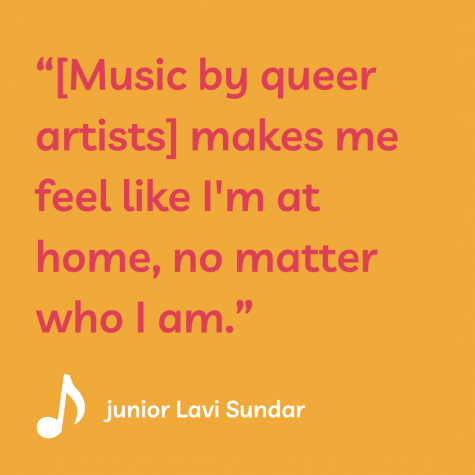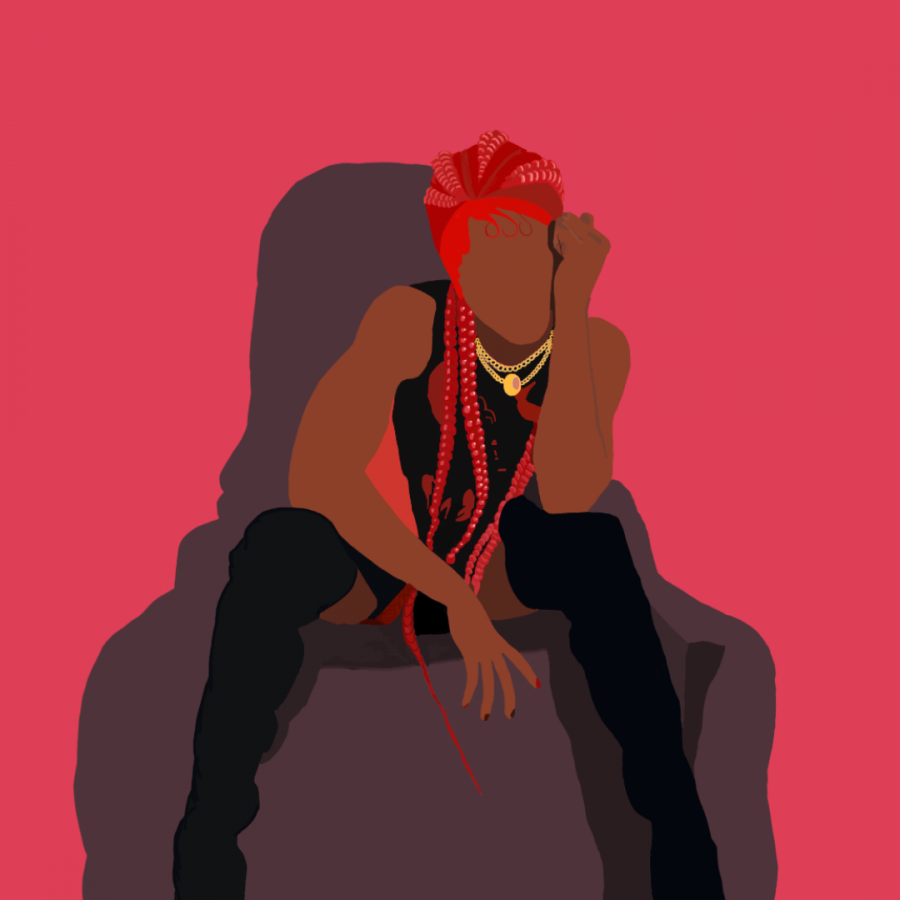Redefining Music
Exploring the impact of LGBTQ+ representation in the music industry on listeners
As R&B artist Raveena lounges on a lawn surrounded by greenery, her outfit pops with vibrancy and playfulness — her green top and magenta pants, her long dangling earrings, the blush high on her cheeks, the red bindi in the center of her forehead and the way her hair is styled in six braids. This is Raveena’s “Raveena @ Home” YouTube video, in which she performs with bassist Aaron Liao.
Leland High School sophomore Kimaya Saijpal has frequently listened to one of Raveena’s songs, “Close 2 U,” throughout the past year, which they describe as a song about wanting a significant other to stay the night. Although music in general has a large impact on Saijpal’s emotions, they find that music by queer artists is especially important to them because of its relatability.
“I really connect to [her song] because it’s a really sweet sentiment, like ‘Don’t go, I want to serenade you to sleep,’” Saijpal said. “If I’m interested in someone, and I was feeling really encompassed in their love and care, I would immediately put on a playlist of my favorite queer femme artists and listen to it and just think, ‘Oh I’m singing this song to you.’ It’s just really personal when it’s like that.”
Junior Serena Miller also relates to music by queer artists, particuarly because they relate to the subject matter of their songs more than they would for non-LGBTQ+ artists. Miller is particularly a fan of the experimental pop artist SOPHIE, who passed away in Jan. 2021, since she helped Miller get through a difficult period of their life.
“The song ‘Immaterial’ by SOPHIE [is] about the reassurance that you [can] be anything you [want],” Miller said. “The bubblegum aesthetic in SOPHIE’s music almost made it seem like gender [is] just this plastic material that could be shaped or molded however you wanted it to be … It just made me think more about the rigid gender expectations that were forced onto me from childhood and what [the point was] of trying to fit into them.”

Saijpal has also found a source of connection and community in queer music that they didn’t have when they were younger. They believe that it’s a “big deal” for artists to directly refer to being LGBTQ+ in their music and recall hearing music by “the same type of white, straight people” in their childhood. The lack of representation made it hard to connect with the songs, especially because Saijpal is a singer and performer themself.
“When I started to get into [music by artists] of color, who are also queer and femme, and I got to listen to their music and also finally identify with their lyrics, it [helped] me to get into a space where I can feel really confident when I’m performing,” Saijpal said. “Listening to music that’s by someone who’s very similar to how you are and living the stories that you’re living is something that everyone should have, no matter who you are and what your identity is.”
Junior Lavi Sundar has been trying to broaden her tastes in the content she consumes, as she wants to listen to artists who “break that heteronormative, cis[gender], white, male mold.” She also believes that the LGBTQ+ community is more represented in alternative genres of music than mainstream genres.
“You hear classic pop songs from Ariana Grande, Taylor Swift [and] Justin Bieber, [and they] are all focused on some kind of romantic interest for the most part,” Sundar said. “I think that it’s a shame that, despite having a genre which is so focused on that particular topic, we don’t get as much same sex representation and normalization of different types of love … I feel like it’s also important to recognize our diversity as people in the LGBTQ+ community [and] recognize that we’re not the same as straight people and that’s OK.”
Miller, who discovered many queer artists through YouTube videos and websites of music reviews, believes that queer artists like SOPHIE helped them understand parts of queer culture, as SOPHIE’s music contains various sounds from queer clubs in the 20th century. According to Miller, the more experimental sounds of many queer artists’ music reflect how queer culture “has always been against the tide.”
However, there are a few queer artists who are part of mainstream music — rapper Lil Nas X, who identifies as gay, debuted his most recent song “Montero (Call Me By Your Name)” at No. 1 on the Billboard Hot 100 chart. The song received backlash for its music video’s sexual suggestiveness and references to the Bible, but Sundar describes it as “iconic,” viewing the biblical motifs as a method to subvert the way some use religion to justify discrimination.

According to Sundar, representation matters in the music industry specifically because music “has a special way of disseminating certain messages.” She mentions that while people usually choose to watch TV or videos, music is often played in public places without their control, and being represented in music can lead people to internalize a sense of belonging.
“[Music by queer artists] makes me feel like I’m at home, no matter who I am,” Sundar said. “In Cupertino, there’s people of all races, all backgrounds, and yet still so many people fall prey to this narrow-minded way of thinking that makes a lot of us feel as if we are not at home in our environments. Listening to these artists who have been able to reach success in such a cutthroat industry, and who have been, for the most part, accepted by their fans and the people around them, is an experience that makes me feel as if I belong.”
Sundar believes that having mainstream artists like Lil Nas X depict the LGBTQ+ community is important for children to grow up with and that “Montero” is a step towards normalizing same sex relationships. According to Saijpal, the normalization of the LGBTQ+ community in music is valuable because people can feel very connected to the songs.
“When you’re growing up and all you’re ever listening to is the same boy-meets-girl romance song that you don’t relate to, it can make you feel like your way of life is not normal, or it doesn’t deserve a happy ending,” Saijpal said. “So when you listen to songs that pertain to you and your sexual identity, it can help you internalize the fact that you are normal. You are loved. You deserve everything. You deserve all the happiness in the world, and you have role models.”

